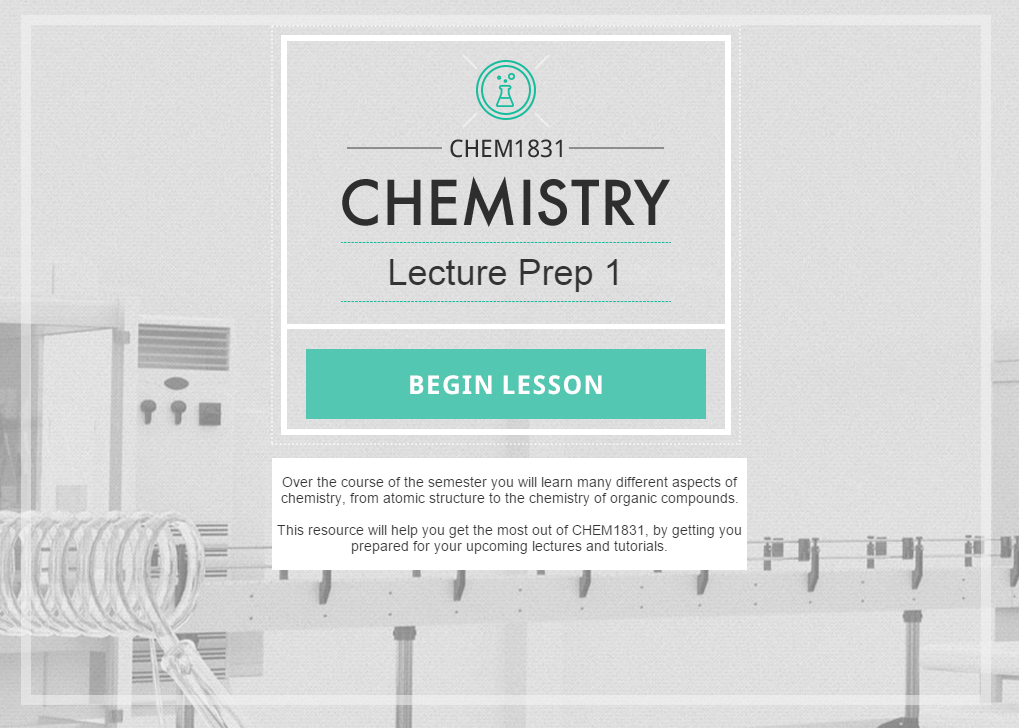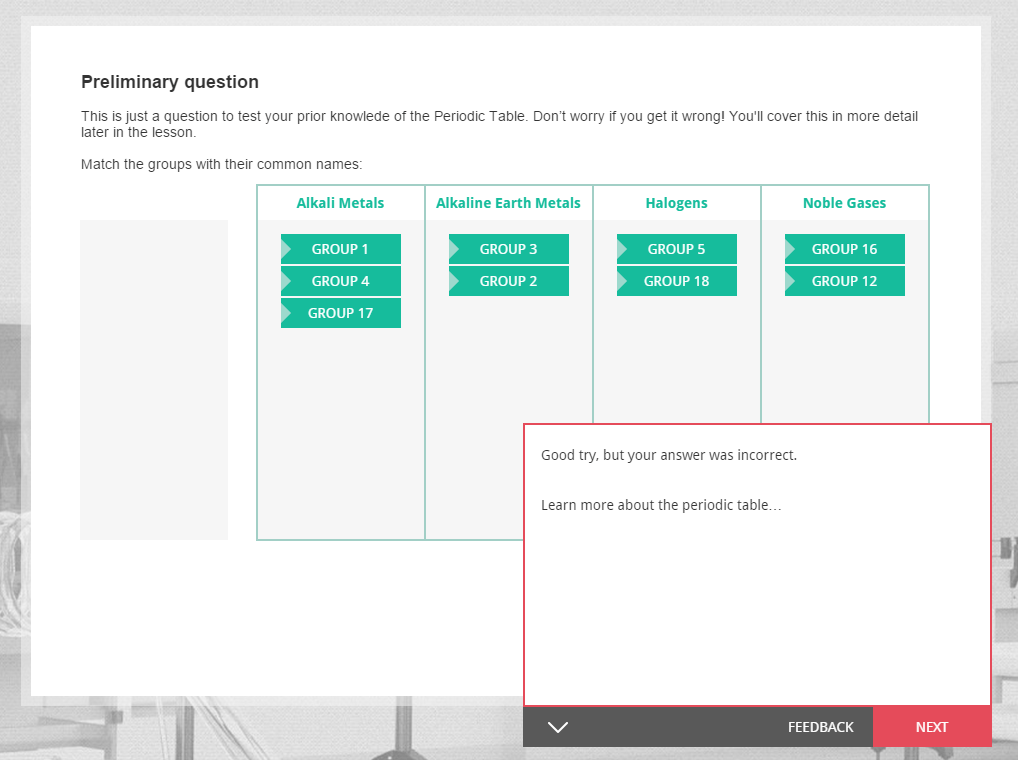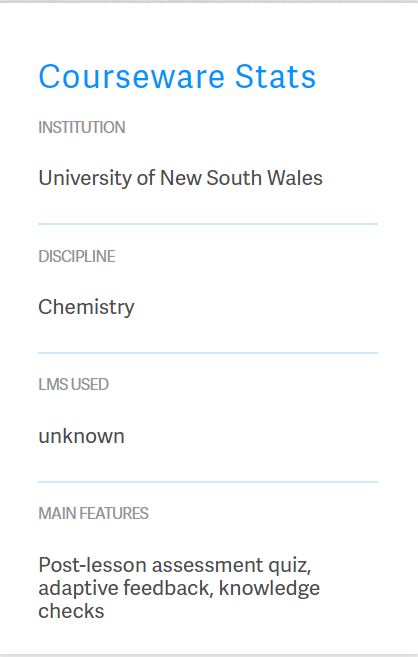DEMOIntroductory Chemistry12Preps Lessons95%Completion Rates2015First Deployment82%Course Satisfaction
Chemistry Faculty Designs Adaptive Lessons, “Lecture Prep” activities, to bring students up to speed before class.
Please Note: This activity is a portion of a larger lesson. It is optimized for desktop use — we recommend viewing full-screen.
Intro
During Semester 1 of 2015, Senior Lecturer Luke Hunter, Ph.D., Student Support Manager Steve Yannoulatos, and Anna Choy, lecturer and head tutor in the Department of Chemistry at the University of South Wales, introduced “Lecture Prep” activities into the CHEM1831 introductory chemistry course. Using Smart Sparrow’s learning design platform, Dr. Hunter, Mr. Yannoulatos and Ms. Choy created 12 online lessons for students to take before the start of the first lecture of each week. Each Lecture Prep was designed to bring students up to speed on the assumed knowledge for that aspect of the course.
By implementing these activities into the course, Dr. Hunter was able to bypass the extra time he’d usually spend in the beginning of the course to cover the basic assumed knowledge, which often left some students bored and disengaged, and others with no chemistry experience, panicked and rushed to catch up. At the end of the semester, students responded very positively towards Lecture Prep, many saying the activities were the best aspect of the course. Overall course satisfaction jumped approximately 10%.
Challenge
First-year students entering introductory chemistry at UNSW often come with varying levels of background knowledge. Therefore, teachers have traditionally had to devote extra time to cover the basic assumed knowledge before introducing new concepts and material. However according to Dr. Hunter, this method didn’t please anyone—it was boring for the students who had already taken chemistry at high school, but on the other hand, it was still too rushed for the students with no chemistry experience.
To address this issue, Dr. Hunter would need a solution that would allow students to assess their knowledge online, and come up to speed on course material at their own individual paces.

Solution
While attending UNSW Learning and Teaching workshops, Dr. Hunter connected with several of his colleagues in biology and medicine who were Smart Sparrow enthusiasts. After hearing about the benefits of incorporating adaptive learning in their teaching and what was possible with adaptive technologies, Hunter teamed up with Yannoulatos and Choy to come up with a plan for delivering online, interactive tutorials that would meet the learning needs of each introductory chemistry student.
In Smart Sparrow, they found a solution that would allow for personalization, which meant that more advanced students could breeze through activities in a short time, while those who were struggling could take as much time as they needed. And its detailed analytics would allow the lecturers to see at a glance which topics were troublesome and merited extra lecture time.
To kickstart their efforts, Hunter, Yannoulatos, and Choy met with the Smart Sparrow team to develop the first story board. Over time, however, the UNSW team gradually advanced at storyboarding and authoring, and began doing them on their own. The result of their efforts was a series of 12 online course activities and assessments (“Lecture Preps”), built using the Smart Sparrow learning design platform and designed to prepare students for the coming week’s lectures.
Each Lecture Prep was self-paced and interactive, and each included a variety of exercises: videos, multiple choice questions, drag-and-drop exercises, and calculations. Every lesson concluded with a 1% assessable quiz that allowed three attempts.

Results
Since implementing Lesson Preps in Semester 1 of 2015, Dr. Hunter has seen a significant increase in student engagement. More than 95% of students completed the Lecture Prep each week, and the cohort spent a median of approximately 1 hour on each week’s lesson, exceeding Hunter, Yannoulatos, and Choy’s expectations. In his end-of-semester course evaluations, many students said the Lecture Preps were the best aspect of the course.
The course also saw notably improved outcomes on the CATEI evaluation compared to 2014. The mean rating for overall course satisfaction jumped from 4.52 out of 6 in 2014 to 4.89 out of 6 in 2015, making CHEM1831 a higher-rated course in 2015 than the university’s “blue-ribbon” mainstream chemistry course. According to Hunter, this improvement was solely attributable to the Lecture Preps, since every other aspect of the course was unchanged from the year before.
Based on final exam results, the project was also successful in terms of student learning. With an almost identical exam to 2014, there was a noticeable improvement in student performance. However, by comparing some exam questions that were kept the same year-on-year, he did see some significant improvements on topics that were supported by Lecture Prep activities.
Dr. Hunter, Mr. Yannoulatos and Ms. Choy also found that their experience with Smart Sparrow gave them a good “foot in the door” for online teaching, and the motivation and confidence to aim for bigger and better things in the future, using the same format. In fact, they are now rolling out Lecture Prep in another class (CHEM1011) in a similar format during Semester 2 2015.
Looking ahead, Hunter, Yannoulatos, and Choy would like to diversify the content delivery within Smart Sparrow, by interspersing more “talking head” video clips within the lessons—adding a variety of interactive exercises and videos. In the longer term (2016-2017), they have big plans for rolling out an expanded version of the Lecture Prep activities in all first year chemistry courses, and using the platform not just to cover assumed knowledge, but actually to be the primary means of delivering and assessing core course content (moving towards a “flipped classroom” format).
Dr. Hunter, Mr. Yannoulatos, and Ms. Choy say they are using the Smart Sparrow experience as a proof-of-concept, to help persuade their colleagues to get on board with online teaching in the future. The success of the Lecture Preps bolsters the argument for the “flipped classroom” model, and Hunter, Yannoulatos, and Choy intend to draw on their results to push for an extension of blended learning at the university.
Student feedback:
- The best features of the course were: “Interactive learning via Lecture Prep.”
- This course could be improved by: “Having more lecture preps and tutorials so content could be better understood.”


